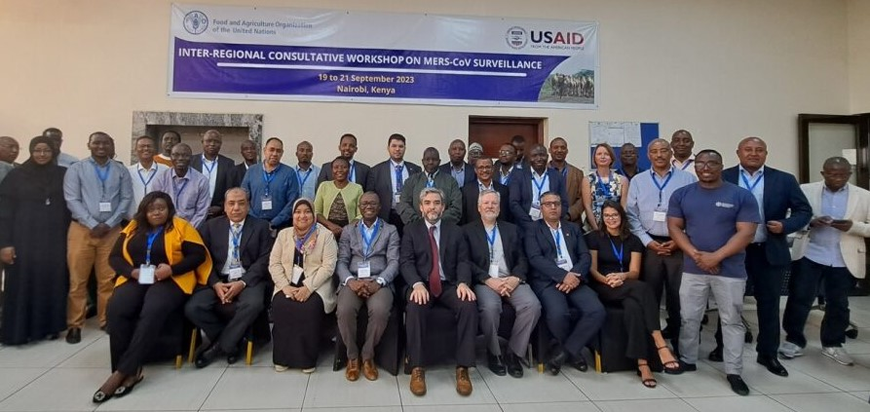You are here
FAO unites experts against Middle East respiratory syndrome coronavirus
By JT - Sep 20,2023 - Last updated at Sep 20,2023

Participants pose for a photo during an inter-regional consultative workshop on Middle East Respiratory Syndrome Coronavirus surveillance in Nairobi, Kenya (Photo courtesy of FAO)
AMMAN — The Food and Agriculture Organization of the United Nations (FAO) brought together technical experts from countries participating in the Emerging Pandemic Threats 2 (EPT-2) Programme in an inter-regional consultative workshop on Middle East Respiratory Syndrome Coronavirus (MERS-CoV) surveillance from September 19 to 21.
The three-day workshop was held in Nairobi, Kenya, with the aim to facilitate knowledge sharing and explore future strategies for enhanced surveillance, according to a FAO statement.
The emergence of MERS-CoV in 2012 brought to light a complex interplay between humans and camels. This virus induces respiratory ailments in humans while maintaining a sub-clinical presence in camels, the statement said.
With a global footprint spanning 27 countries, MERS-CoV has infected 2,605 individuals, leading to 937 associated fatalities – a 36 per cent case fatality ratio. The World Health Organization (WHO) ranks MERS-CoV among the top three high-threat zoonotic coronaviruses.
Since 2016, FAO, through its Emergency Centre for Transboundary Animal Diseases (ECTAD), partnered with countries across the Horn of Africa and Middle East — including Egypt, Ethiopia, Kenya and Jordan — to drive vigilant surveillance and applied research initiatives focused on MERS-CoV. This collective effort operates within the framework of the EPT-2 Programme, funded by the United States Agency for International Development (USAID).
Over the years, these collaborative studies have illuminated key insights, enhancing our comprehension of MERS-CoV's regional risks.
At the Opening Ceremony, USAID Regional Emerging Threats Advisor Ricardo Echalar said: “The project revealed 60 per cent of camels in the Horn of Africa's arid and semi-arid lands show MERS-CoV infection evidence.” He also added that “the studies generated by the project have contributed to a deeper understanding of the risks associated with MERS-COV in countries”.
In representation of the Directorate of Veterinary Services (DVS) in Kenya, Harry Oyas, Senior Deputy Director of the DVS, said: “In Kenya, we host around 6 million camels, and 80 per cent of population of arid and semi-arid areas rely on camels as part of their livelihoods, transport or nutrition”.
FAO ECTAD Eastern and Southern Africa Regional Manager, Charles Bebay, on behalf of FAO Representative to Kenya, said: “Though much has been achieved over the past almost one decade of investment in MERS-CoV, we need to continue to be vigilant in order to build on the gains made. We can leverage on the global advances in coronavirus diagnostics and vaccine production, which have exploded in the last five years due to COVID-19, to accelerate efforts to address the MERS-CoV threat.”
Related Articles
Saudi Arabia is seeing "sporadic" cases of the Middle East Respiratory Syndrome coronavirus (MERS-CoV), which has killed 324 people in the country, the health ministry said Thursday.
The Ministry of Health has raised alert levels across the Kingdom following the death of two Jordanians infected with MERS coronavirus and H1N1, a ministry official said on Saturday.
King Abdullah named a new health minister Monday to lead the fight against the MERS virus that has cost more than 350 lives in Saudi Arabia, after his predecessor was sacked.














